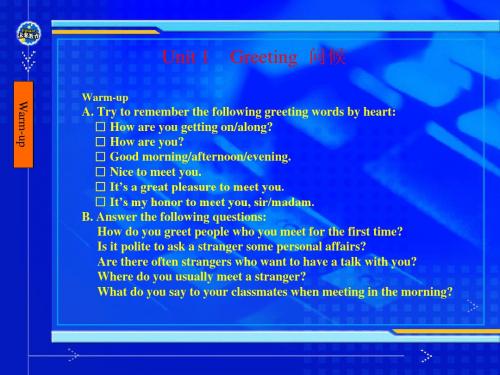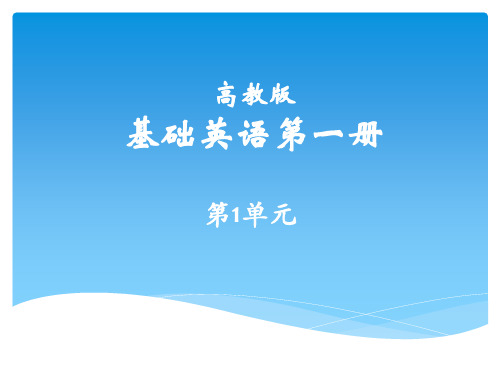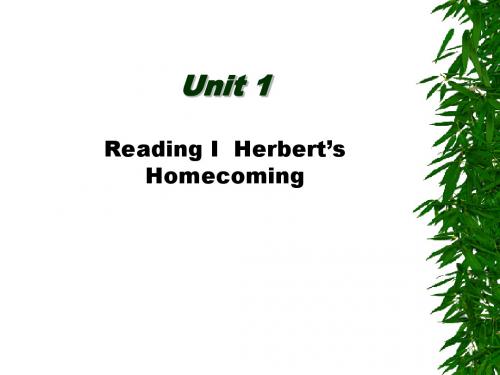英语基础教程第一册unit 1
- 格式:pptx
- 大小:30.86 MB
- 文档页数:31



新起点大学基础英语教程读写教程1unit1<<新起点大学基础英语教程1>>教学大纲一、说明(一)教学目的与要求:通过让学生学习英语,培养学生一定得听说读写能力和阅读能力,使他们用英语基本交流,这本教材能够很好的帮助学生,掌握良好的语言学习方法,打下扎实的基础。
(二)教学重点与难点第一章:掌握本单元的单词,巩固加深基本语法知识。
第二章:阅读一般难度的文章,掌握中心大意,并具有一些判断,推理,分析能力。
第三章:听懂英语讲课,并能能够熟悉教材,了解简单的句子。
第四章:在教材内容中的听答能进行复述,能用英语正常交流。
第五章:掌握生单词和课文大意,能适当的翻译句子。
第六章:能借助词典将略低于英语短文翻译成中文,理解正确,译文答译。
第七章:掌握本单元新单词,课文,能完成课后练习。
第八章:对本章所将的课文能进行简单的英文发言。
第九章:提高在语篇水平上运用语法知识的能力。
第十章:通过概括性的练习帮助学生对课文进行宏观分析,掌握中心思想。
(三)教学方法与改革精髓教学方法:课堂教学改变传统的以教师讲授为主的单一课堂教学模式,积极采用新的教学方法,真真体现英语教学的实用性,文化性和趣味性的融合,使英语教学朝着个性化,自主式学习方向发展,语言能力语法能力得到提高,是英语课程教改的重点。
(四)总学时(五)学分(六)开课学期第一学期二.教学内容和学时分配(一)教学内容Unit1:How to study English(1)Unit1:How to study English(2)Unit2:From Trash to TreasureUnit3: The Best Teacher I Ever HadUnit4: Audrey HepburnUnit5:Sports Around the WorldUnit6:A Nice Cup of TeaUnit7:Bring Your PC to CollegeUnit8:Icehotel Attracts TouristsUnit9:How to Cope with StressUnit10:Banking Services三.教材与参考书目(一)教材:<<新起点大学基础英语教程>>总主编:杨治中主编:王海啸外语教学与研究出版社(参考书目):教育部制定的《新起点大学英语课程教学大纲》。



Unit 1DIALOGUE IBack from the Summer CampA: You know what? I've just come back from a wonderful summer camp.B: You have? Where did you go?A: Mount Tai.B: I've been there too. It's one of China's most beautiful mountains. There're many scenic spots and places of historical interest. I was greatly impressed by its natural beauty when I took a study tour there two years ago.A: It really is a very beautiful tourist attraction. But we went there as campers, not as tourists. It was a study programme organized by our local community committee.B: I bet you had lots of fun there.A: Yes, it was a wonderful experience. You know it was the first time I'd been to a summer camp in five years, and it brought back such sweet memories.B: Were there any other camping groups when you were there?A: Not when we arrived at the foot of the mountain. But soon we were joined by many similar camping groups from other cities. By the time we arrived at the campsite, night had fallen. And we were so happy to see that the campers who arrived there the day before were giving a performance by the campfire.B: You remind me of my last trip there. I wish I had been there with you this time. What did you do at the summer camp? A: Oh, lots of things. Most of the time we studied plants, rocks, insects... things like that. We also had lots of fun, hiking, climbing mountains, taking pictures...B: I guess you had the life of a natural scientist.A: And the life of an athlete, too.B: I had a similar experience during the summer two years ago. I remember my summer camp was subdivided into what we called "hobby groups", such as the music group, the drama group, and the model aircraft and ship group. People sharing similar interests and hobbies worked together. Were there any hobby groups in your programme?A: Yes, of course. We had a number of hobby groups for campers with varied interests. We called them "project groups" because each group worked on a particular project. At the completion of their projects, each group presented their "fruits" to all the campers. Some gave oral reports, some staged an exhibition, and others put on a performance.B: You had a marvellous time this summer! Your story has really brought back happy memories of my own camping experience.DIALOGUE IIDialogue:Sally Jones, an English language teacher from Oxford University, has just arrived at Beijing Airport. She is going to spend three months here, lecturing and teaching at different colleges and universities. Miss Wang, Secretary of the English Department, and Mr. Yu, Vice Chairman of the English Department, have come to the airport to meet her.Miss Wang: Excuse me, are you Miss Jones?Sally: Yes, that's right.Miss Wang: Oh, how do you do? I'm Wang Xinfu, Secretary of the English Department.Sally: Oh, yes, Miss Wang, hello. I'm very pleased to meet you. (They shake hands.)Miss Wang: Miss Jones, may I introduce you to Mr. Yu, Vice Chairman of the English Department?Mr. Yu: Hello, Miss Jones, I've been looking forward to meeting you.Sally: How do you do? (They shake hands.) It's very kind of you both to come and meet me at the airport.Miss Wang: Not at all. I hope you had a good flight.Sally: Well, not too bad. It was a bit bumpy as we came in to land; some low clouds, I think.Mr. Yu: Yes, we had a storm here yesterday and the weather is still a bit unsettled.Sally: Oh, dear! I was rather lucky then!Miss Wang: You must be rather tired after your long flight.Sally: Well, yes, I am actually... I've been travelling for 21 hours!Mr. Yu: In that case, I think we should go straight to the hotel.Miss Wang: Yes, I agree. This way then, ... if you'd like to follow me.READING IHerbert's HomecomingHerbert Marshall was a student at Cambridge, but his hometown was St. Albans. It was August and the family had gone to the seaside. Herbert went to France for his holiday, but he ran out of money, and came home a week earlier than he had expected to.His train didn't get into St. Albans until just before midnight. The last bus had gone, so he had to walk home. He let himself into the kitchen, and as he was feeling hot and sticky, he took off his shirt to have a wash.Suddenly he heard heavy footsteps running up the path. The back door burst open, and he found himself surrounded by policemen. They pushed him into the living-room next door, made him sit down, and began asking him question."What's your name?""Where do you live?""What's in that case?""What are you doing here?""I live here," said Herbert, "I've been on holiday." But nobody listened to him. They just went on asking questions. Then suddenly one of the policemen said:"Watch him, Frank — we'll go and search the house."They left a tall, very young policeman to guard him."Can I put my shirt on?" asked Herbert."No," said the policeman, "stay where you are."Then the others came back with an older man, a sergeant. He asked the same questions, but he listened to Herbert's answers."I live here," said Herbert, "and I want to put my shirt on." The sergeant looked at him thoughtfully."We'll soon settle this," he said.He went out and came back with a small, sandy-haired man wearing a shabby, brown dressing-gown. It was Herbert's next-door neighbour. He peered at Herbert intently through thick spectacles."Oh, yes, sergeant," he said, "that is Mr. Marshall." Then he disappeared very quickly. The policemen all looked dreadfully disappointed. They were convinced they had caught a burglar."Did he ring you up?" asked Herbert. The police sergeant nodded."He saw a light and understood your family had all gone away to the seaside."When they had all gone, Herbert made himself a cup of coffee.。
英语1基础模块第一单元知识点讲解【篇一:英语1基础模块第一单元知识点讲解】book1unit meetyou! (第一课时教学设计)一、学情分析本单元是新生入学的第一单元,教学重点是活用招呼用语、相互了解个人基本信息、制作个人名片、学习不同职业的表达与描述以及练习发音。
就学习英语而言,职业学校的许多学生是胆大心粗,能说不会写或写不到位。
因此,教师在教学过程中应充分利用学生的特点开展相应活动。
我们可以利用学生胆大、敢说的特点,充分利用头脑风暴法采集相关素材,开展如招呼用语集锦、刨根问底探隐私、名片栏目大荟萃等活动。
教学中名片栏目的设计、描述不同职业、圆润的发音是本单元难点。
圆润的发音要靠长期的示范与坚持来实现。
名片中各栏目的设计可以集体讨论商定,个人名片设计则可以体现个性化、专业化,并决出最佳名片设计奖,教师还可以请学生一起收集生活中的名片,探讨名片的基本要素和个性特色。
职业的描述教师可以借助体态语、道具、图片、视频等来推进,还可以设计相应的练习强化学生的认知。
本单元设计分为4 个课时:第一课时 lead-in speaking第二课时reading writing第三课时 language vocabularyconsolidation 第四课时 unit task pronunciationpractice 第一课时 lead-in speaking二、教材分析 1.教学内容本课时系教材《英语 1》(基础模块高教版)第一单元的第一课时,包括 lead- speaking两部分,具体内容为:招呼用语,听懂并掌握询问和提供个人信息的词汇、句型。
2.教学重点、难点教学重点招呼用语,听懂并掌握询问和提供个人信息的词汇、句型教学难点个人信息的词汇、句型三、教学目标知识目标掌握与个人信息相关的词汇,如name, first name; last name; name card; telephone number; age; address; e-mail address; job (engineer; manager; secretary; teacher; student; doctor; nurse; singer; fans); position(boss); 掌握提供或询问个人信息时所使用的句型,如: aboutgreeting: good morning. hi. meetyou. aboutpersonal information what’s you name? where youfrom? which company youfrom? 能力目标学生能听懂关于询问和提供个人信息的对话。